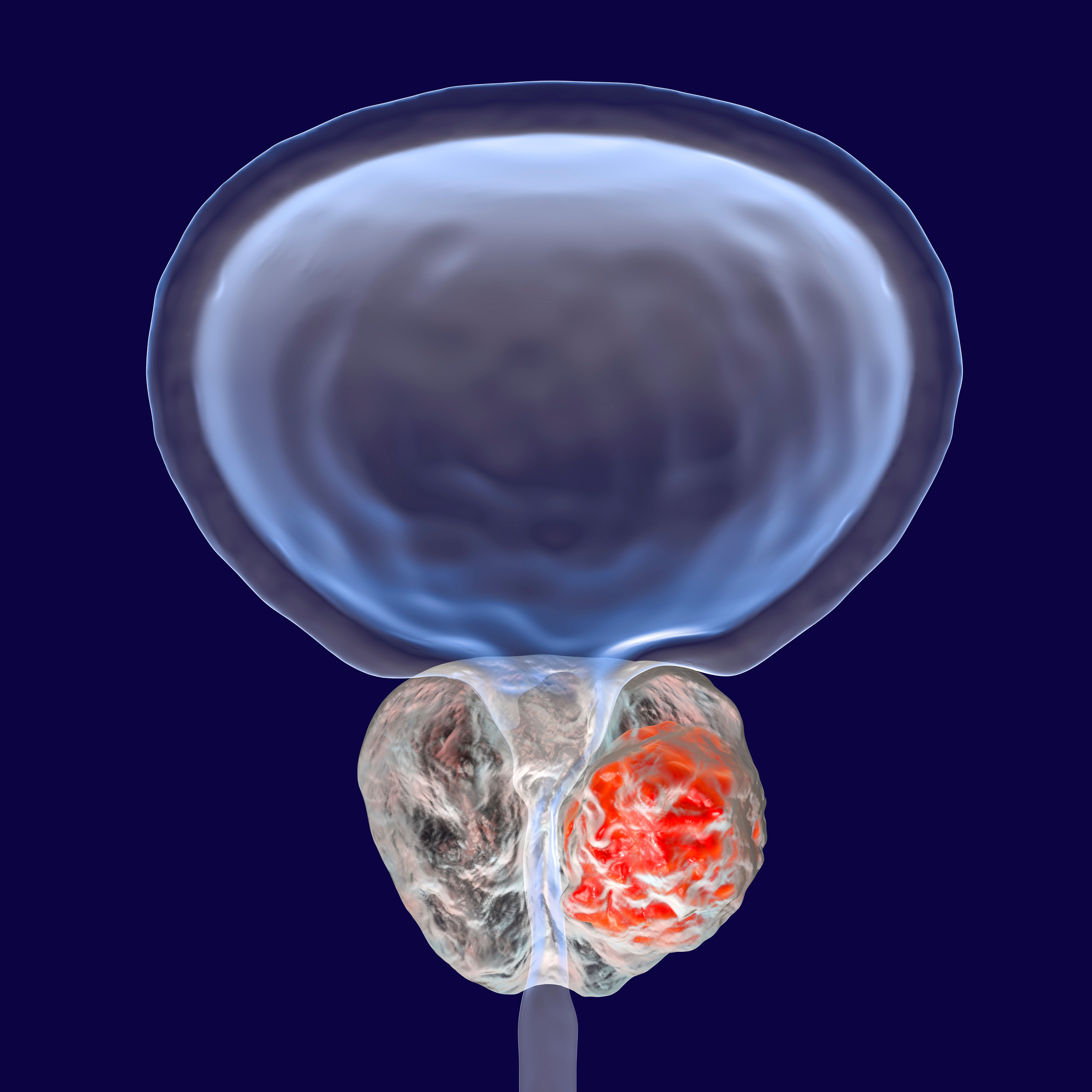First Patient With mCRPC Receives Highest Dose of Novel PSMA Theranostic
Following positive results from cohorts 1 and 2 of the SECuRE trial, dosing of 64Cu/67Cu SAR-bisPSMA has begun in patients with metastatic castration-resistant prostate cancer in cohort 3.
3D illustration showing presence of tumor inside prostate gland © Dr_Microbe - stock.adobe.com

The first patient with metastatic castration-resistant prostate cancer (mCRPC) has been treated in cohort 3 of the SECuRE trial (NCT04868604) investigating 64Cu/67Cu SAR-bisPSMA.1
Cohort 2 of the phase 1/2a SECuRE study was recently completed and evaluated 3 participants given 67Cu SAR-bisPSMA at the dose level of 8GBq. Findings showed that this dose generated positive effects on all patients with a greater than 50% reduction in prostate specific antigen (PSA) levels within weeks of a single dose. For safety, no dose-limiting toxicities were reported.
Now, patients in cohort 3 will be treated at the highest dose level of 12GBq with recruitment ongoing at clinical sites in the United States.
"The fast pace of recruitment into the dose-escalation phase of the trial is indicative of the high unmet need in the prostate cancer therapy space and we are thrilled to be working on a solution that has potential to not only offer treatment benefits to patients with mCRPC, but also resolve the logistical and manufacturing challenges of the current-generation radiopharmaceuticals, such as 177Lu PSMA-617, especially now with the availability of commercial quantities of the 67Cu radioisotope routinely produced domestically in the United States and exclusively supplied to us by NorthStar,” said Alan Taylor, MD, executive chairperson of Clarity, in a press release.
The multicenter, single-arm, dose-escalation, phase 1/2a theranostic SECuRE trial is evaluating up to 44 patients with PSMA-expressing mCRPC using 64Cu/67Cu SAR-bisPSMA. The agent was developed to visualize PSMA-expressing lesions and identify those who are candidates for subsequent 67Cu SAR-bisPSMA therapy.2
Enrollment in the study is open to patients aged 18 years and older with histological, pathological, and/or cytological confirmation of prostate cancer who have a life expectancy >6 months, an ECOG performance status of 0, 1, or 2, a positive 64Cu-SAR-bisPSMA PET/CT scan, castrate level of serum/plasma testosterone, and adequate organ function. Patients must also have progressive mCRPC, despite prior androgen deprivation therapy, and at least enzalutamide (Xtandi) and/or abiraterone (Zytiga), have ≥1 metastatic lesion present at screening CT, MRI, or bone scan imaging ≤28 days before study enrollment, and have recovered to ≤ grade 2 from all clinically significant toxicities related to prior therapies.
In cohort 2, 3 participants were given a single dose of 8GBq of 67Cu SAR-bisPSM, and have been monitored by their physicians for safety and treatment response as per the trial protocol. Each of the 3 patients remain on the trial, and PSA levels continue to fall in all patients, with the first 2 showing reductions of greater than 95%. So far, the last patient has also shown a drop of approximately 70%.1
"Results from cohort 2 are incredibly exciting and we look forward to seeing data from the increased dosing of 12GBq as well as discover the potential positive effects of multi-dosing on prostate cancer patients,” said Taylor, in the press release.
Cohort 3 is evaluating the effects of the highest dose, 12GBq, on patients after they received a single administration of 67Cu SAR-bisPSMA. This cohort will be the last to assess single doses of 67Cu SAR-bisPSMA. Following completion of the third cohort, a multi-dose cohort, pending safety evaluation, will be initiated.
Overall, the aim of the trial is to determine the safety, efficacy, and tolerability of 67Cu SAR-bisPSMA for the treatment of prostate cancer with primary end points of biodistribution and dosimetry of 64Cu-SAR-bisPSMA, maximum tolerated dose, recommended dose, PSA response, radiographic response, and treatment-emergent adverse events.
"We look forward to sharing more data on 67Cu SAR-bisPSMA as we continue to recruit participants into the SECuRE trial and progress on our path towards commercialisation with the ultimate goal of improving treatment outcomes for people with cancer," concluded Taylor.